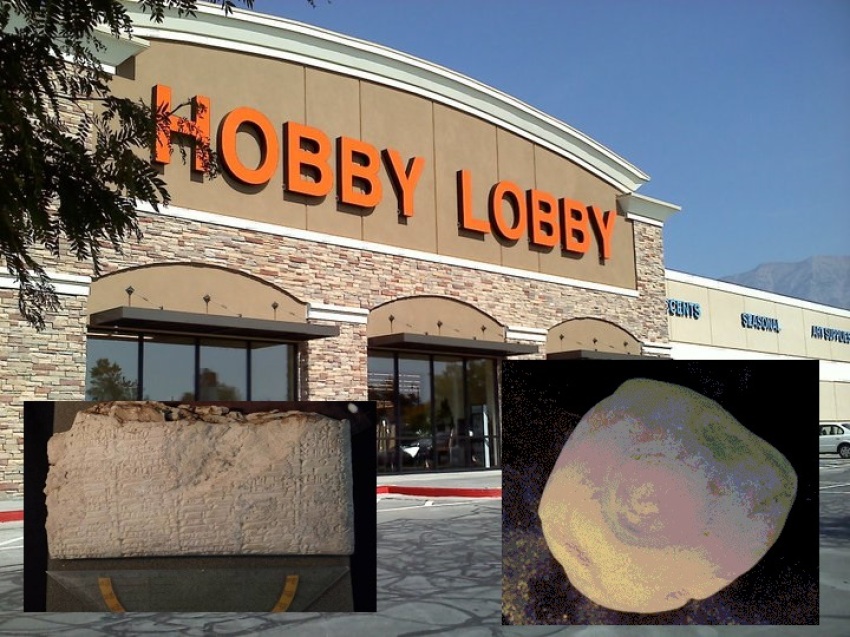Hobby Lobby to Pay $3M Fine, Forfeit Biblical Artifacts Smuggled From Iraq

Christian-owned Hobby Lobby, the world's largest private arts-and-crafts retailer, agreed to pay $3 million and forfeit thousands of biblical cuneiform tablets and clay bullae to settle a civil complaint the U.S. government filed against the company Wednesday.
The government's complaint alleged that Hobby Lobby, whose president Steve Green is head of the Museum of the Bible slated to open in Washington, D.C., in November, acquired artifacts originating in modern-day Iraq that were unlawfully smuggled from the United Arab Emirates and Israel as "ceramic tiles" or "clay tiles (sample)."
"We should have exercised more oversight and carefully questioned how the acquisitions were handled," Green said in a statement on the settlement. "Hobby Lobby has cooperated with the government throughout its investigation, and with the announcement of today's settlement agreement, is pleased the matter has been resolved."
The company explained that it began acquiring a number of historical Bibles and other artifacts in 2009 "to preserve these items for future generations, to provide broad access to scholars and students alike to study them, and to share the collection with the world in public institutions and museums."
"The Company was new to the world of acquiring these items, and did not fully appreciate the complexities of the acquisitions process. This resulted in some regrettable mistakes. The Company imprudently relied on dealers and shippers who, in hindsight, did not understand the correct way to document and ship these items. However, since learning of these errors, the Company has been an active participant with the government's investigation and supports its efforts to protect the world's ancient heritage," the statement said.
The DOJ said Green and a consultant traveled to the UAE in July 2010 to inspect a large number of cuneiform tablets and other antiquities being offered for sale.
Cuneiform is an ancient system of writing which emerged after mankind's language was confused at Babel. People living in Mesopotamia, such as the Sumerians and the Babylonians, used it. Clay bullae or seal impressions are said to be among the most common biblical artifacts found in Israel and the Near East.
An expert on cultural property law retained by Hobby Lobby warned the company in October 2010 that the artifacts may have been looted from archaeological sites in Iraq. Hobby Lobby was also warned that if the artifacts were improperly declared to U.S. Customs and Border Protection, the artifacts could be seized and forfeited.
Hobby Lobby forged ahead with an agreement, however, to purchase more than 5,500 artifacts which included cuneiform tablets and bricks, clay bullae and cylinder seals, for $1.6 million. The DOJ explained that there were several red flags about the manner in which the artifacts were acquired.
For example, Hobby Lobby representatives did not meet or communicate with the dealer who purportedly owned the artifacts, nor did they pay him for the artifacts, the DOJ said. Following the direction of another dealer, however, the company wired payment for the artifacts to seven personal bank accounts held in the names of other individuals.
A dealer, with the consent of Hobby Lobby, then shipped several packages to separate corporate addresses in Oklahoma City, Oklahoma, where Hobby Lobby is headquartered with "shipping labels that falsely and misleadingly described their contents."
Hobby Lobby maintained that at no time did the company ever purchase items from dealers in Iraq or from anyone who indicated that they acquired items from that country. The company further noted that it has now "implemented acquisition policies and procedures based on the industry's highest standards established by the Association of Art Museum Directors."
"We have accepted responsibility and learned a great deal," said Green. "Our entire team is committed to the highest standards for investigating and acquiring these items. Our passion for the Bible continues, and we will do all that we can to support the efforts to conserve items that will help illuminate and enhance our understanding of this Great Book."
Bridget M. Rohde, acting U.S. attorney for the Eastern District of New York, stated in the government's response that "American collectors and importers must ensure compliance with laws and regulations that require truthful declarations to U.S. Customs and Border Protection, so that Customs officers are able to scrutinize cultural property crossing our borders and prevent the inappropriate entry of such property.
"If they do not, and shippers use false declarations to try to clandestinely enter property into the United States, this Office and our law enforcement partners will discover the deceit and seize the property."
Rohde thanked U.S. Customs and Border Protection for assisting with the interception of shipments and safeguarding the seized antiquities.
"The protection of cultural heritage is a mission that HSI and its partner U.S. Customs and Border Protection take very seriously as we recognize that while some may put a price on these artifacts, the people of Iraq consider them priceless," added Angel M. Melendez, special agent-in-charge at U.S. Immigration and Customs Enforcement, Homeland Security Investigations in New York.
The Museum of the Bible is slated to open in Washington, D.C., in the fall. According to its website, the museum collections are "an aggregation of several of the world's most prominent private collections of biblical objects and artifacts. These collections allow the Museum of the Bible to convey the global impact and compelling history of the Bible in a unique and powerful way."
Steven Bickley, Museum of the Bible's vice president of marketing, administration, and finance, said they don't "have any concerns about our collection," noting that "the artifacts that were referred to were never in our collection," as reported by The Atlantic. The museum wasn't part of the investigation or the settlement, he said.



























